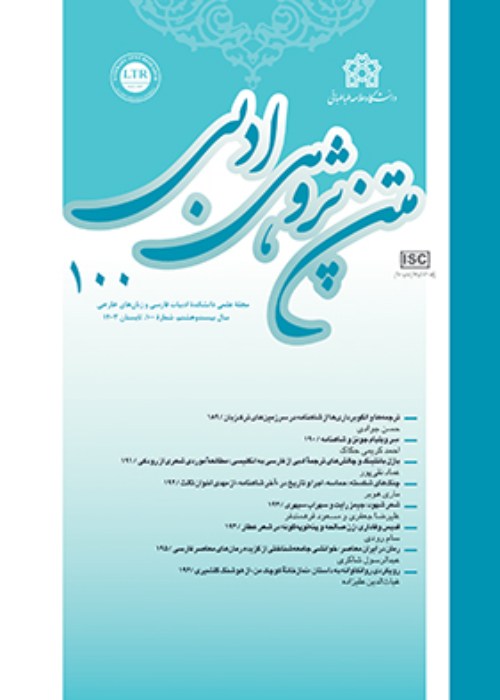Chardh Narrative
Author(s):
Abstract:
One of the verses in Hafiz Poetry which provokes a lot of discussion is the verse located at the beginning of the page. The problem is being approached from different angles: 1. With regard to the first verse, which one is correct? «گر خود», «ور خود» or «ار خود»? 2. The question arose as to whether we should consider the verse a conditional case and we must interpret it or not? 3. What is meant by Chardh Narrative in the second verse? The present paper is an attempt to indicate first, the preference of the two terms of «گر خود» and «ار خود», which share the same meaning and have been used in the former six versions (before 850 AH), to the term «ور خود» which has been erratically used in just one version of that era (before 850 AH). Second, based upon the first part, the verse must be dealt with as a conditional case and therefore interpreted. Third, Chardh Narrative means the narratives of fourteen innocent (PBUH) in commentating Quran.
Language:
Persian
Published:
Literary Text Research, Volume:13 Issue: 41, 2009
Page:
49
magiran.com/p733093
دانلود و مطالعه متن این مقاله با یکی از روشهای زیر امکان پذیر است:
اشتراک شخصی
با عضویت و پرداخت آنلاین حق اشتراک یکساله به مبلغ 1,390,000ريال میتوانید 70 عنوان مطلب دانلود کنید!
اشتراک سازمانی
به کتابخانه دانشگاه یا محل کار خود پیشنهاد کنید تا اشتراک سازمانی این پایگاه را برای دسترسی نامحدود همه کاربران به متن مطالب تهیه نمایند!
توجه!
- حق عضویت دریافتی صرف حمایت از نشریات عضو و نگهداری، تکمیل و توسعه مگیران میشود.
- پرداخت حق اشتراک و دانلود مقالات اجازه بازنشر آن در سایر رسانههای چاپی و دیجیتال را به کاربر نمیدهد.
In order to view content subscription is required
Personal subscription
Subscribe magiran.com for 70 € euros via PayPal and download 70 articles during a year.
Organization subscription
Please contact us to subscribe your university or library for unlimited access!


